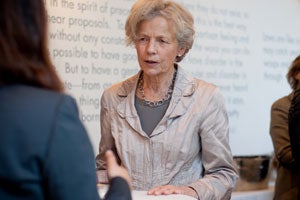On May 10-11, the HLS Child Advocacy Program held a Prevention & Protection Brainstorming Workshop, which brought together researchers, advocates, and practitioners in the field from around the country to discuss strategies to prevent maltreatment and protect vulnerable children. The event followed last year’s CAP conference that examined race and child welfare. The founder and faculty director of the program, Professor Elizabeth Bartholet ’65, spoke about the workshop and her longtime efforts to improve the child welfare system:
Q.: What were some of the key issues raised in the Prevention & Protection Brainstorming Workshop?
A: The overall focus was how we could do better by children in terms of the harm they suffer from parental abuse and neglect by intervening earlier and more effectively. We focused a lot on universal home visitation as a method of preventing maltreatment from occurring in the first place, reaching out to new parents during pregnancy and after birth for a couple of years, targeting all parents, not just high-risk parents, and offering them home visitors who could model and teach about parenting and link parents to other services that could help them avoid the kind of trouble that is correlated with child maltreatment. The other major theme was how we could make coercive child protective services more effective in terms of intervening early enough so that even if kids have been abused and neglected, they don’t end up being abused and neglected for several years.
Q.: What about the resources needed to do these early intervention efforts?
A: A Rand economist presented very interesting evidence that although many people think services targeted on high-risk groups alone are more cost effective, that’s not necessarily true. If you try to reach everybody but then target those who really need it, it’s actually more cost effective. Although such programs might initially seem costly, most agree that in the long term, if they helped prevent maltreatment they would be cost effective.
Q.: How do you find the right balance of giving families autonomy but also giving them the services that will help?
A.: That’s a hugely important issue. At the workshop we did have in the room some fierce family preservation advocates and people who were quite fierce critics of what they see as undue family preservation bias. When you focus on the early support programs, like voluntary home visiting, I’d say there isn’t much of a divide between these groups because most agree that we should do more to support poor families upfront. But some of us were concerned that the research on various early intervention programs focuses so exclusively on whether these programs succeed in keeping kids at home. We felt the research should also examine whether kids do better when they’re kept at home than when removed to foster care and moved on to adoption.
Q.: How has the Child Advocacy Program influenced the area of child protection since the program started in 2004?
A.: I would like to think that the program, through events like the racial disproportionality conference and this workshop, and also through our teaching and the way we’re shaping the consciousness of students, is putting a healthy emphasis on the child’s rights and interests. Everyone in child welfare always talks as if that’s the central issue, but they haven’t been challenged to think about whether promoting family preservation to the degree they do really is designed to serve children’s interests as opposed to adult interests. Also, given that children’s legal issues generally are treated by the law as of little importance, I think the existence of this CAP program has made a huge statement that Harvard Law School takes kids seriously. It’s also very important that CAP educates some 200 students a year to recognize the importance of child-related issues and to look at them with a genuine focus on child rights and interests.
Q.: What inspired you to devote your work to child welfare issues?
A.: Twenty-seven years ago I adopted a child from Peru. When I came back, for the first time I began focusing my work on issues surrounding adoption and reproductive technology, and I then expanded my interests into the child welfare, foster care, child maltreatment areas. What I discovered when I started to focus on children was that this is a uniquely disempowered group. Children can’t vote, they can’t get out on the street and demonstrate, if they’re young enough they can’t even talk. I felt as I began to explore those issues that it was a field in desperate need of social change and law reform.
—Lewis Rice
